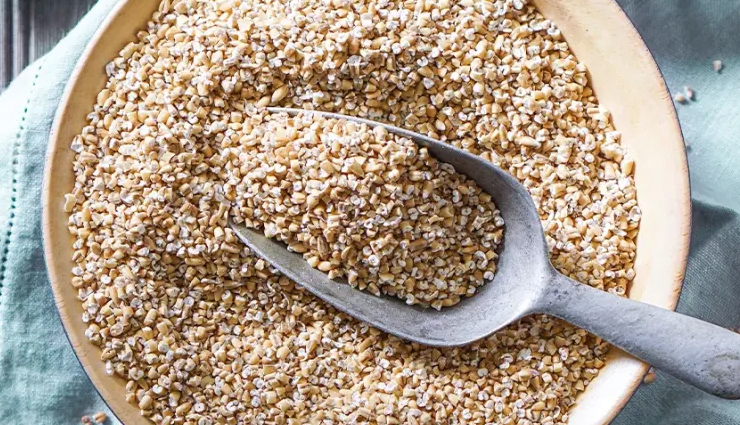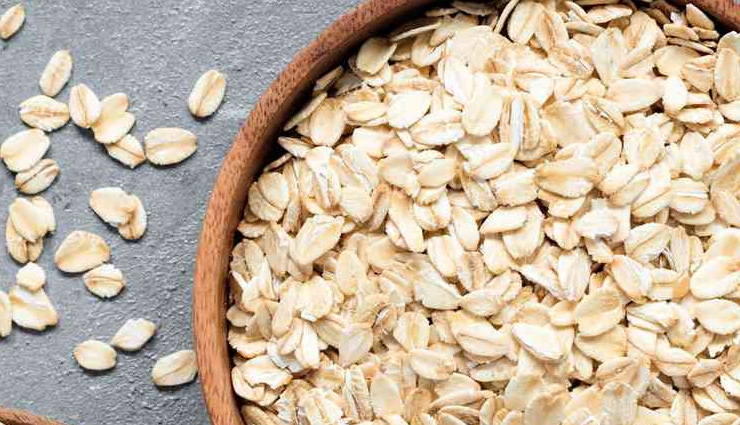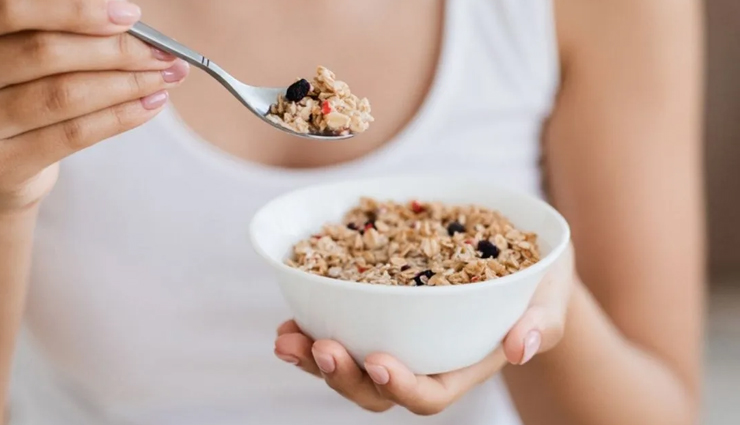- Home›
- Healthy Living›
- Is Oatmeal Good For Constipation?
Is Oatmeal Good For Constipation?
By: Priyanka Maheshwari Wed, 26 July 2023 3:34:51

Oatmeal has been the recent rage amongst all breakfast options! While popular for its convenience, versatility, and many health benefits, do you know that eating oatmeal is good for constipation as well? Along with being enriched with many vital vitamins and minerals, oatmeal is an important source of dietary fiber. This makes it good for your heart and digestive metabolism as well. To know how oatmeal can get things going for you, read on!
Oats – A Brief
Oats are a highly popular and nutritious cereal grain, belonging to the Avena sativa species. They are widely consumed as a staple food worldwide and offer numerous health benefits. Oats are rich in essential nutrients like fiber, protein, vitamins (B-complex), minerals (iron, magnesium, phosphorus), and antioxidants.
The health benefits of oats include supporting heart health through their beta-glucans, which help lower LDL cholesterol levels and reduce the risk of heart disease. Oats also aid in digestive health by providing ample fiber, promoting better digestion, and supporting a healthy gut environment.
For those looking to manage weight, oats' high satiety value keeps them feeling full for longer, leading to reduced calorie intake. Their soluble fiber content also helps regulate blood sugar levels, making them suitable for individuals with diabetes.
Additionally, oats contain antioxidants like avenanthramides, which protect cells from oxidative damage and have anti-inflammatory properties. Being incredibly versatile, oats can be prepared in various ways such as oatmeal, overnight oats, granola, and energy bars, making them a valuable addition to a balanced diet.

Why Is Oatmeal Good For Constipation?
Oatmeal is a rich source of dietary fiber, making it beneficial for relieving constipation. It contains both soluble and insoluble fiber, which play important roles in promoting healthy bowel movements.
The high fiber content in oatmeal helps maintain regular bowel movements. The soluble fiber absorbs water and forms a gel-like substance in the intestines, softening the stool and easing its passage. On the other hand, the insoluble fiber adds bulk to the stool, stimulating the colon's muscles and encouraging waste movement through the digestive tract.
Oatmeal's fiber content also supports a healthy gut environment by nourishing beneficial gut bacteria, positively impacting digestion and overall gut health. Additionally, oatmeal's high fiber content promotes a feeling of fullness, potentially aiding in weight management and preventing overeating. Proper hydration is crucial when consuming oatmeal, as sufficient fluids help support the fiber's proper function and prevent dehydration.
Incorporating oatmeal into the diet, along with other fiber-rich foods and staying physically active, can contribute to overall digestive health and alleviate constipation effectively. Overall, oatmeal is an excellent dietary option for promoting regular bowel movements and providing relief from constipation.
Type Of Oatmeal To Relieve Constipation
Oatmeal offers relief from constipation and numerous health benefits, but selecting the right type of oats is crucial. With a wide variety available in the market, it can be overwhelming to choose. Take the time to explore and compare the options to find the most suitable variant. It's essential to note that all packs of oats undergo some processing before reaching the shelves.

# Steel-Cut Oats
Steel-cut oats, also known as Irish oats or pinhead oats, are a type of whole oat groats that have been cut into smaller pieces using steel blades. They have gained popularity due to their nutty flavor, chewy texture, and various nutritional benefits. Here are some advantages and disadvantages of consuming steel-cut oats:
Advantages:
Nutrient-Rich: Steel-cut oats retain more of their natural nutrients compared to rolled or instant oats. They are a good source of fiber, protein, vitamins (B-complex vitamins), minerals (iron, magnesium, phosphorus), and antioxidants.
Low Glycemic Index: Steel-cut oats have a lower glycemic index compared to instant oats and processed cereals. This means they cause a slower and steadier rise in blood sugar levels, making them suitable for individuals with diabetes or those aiming to manage blood sugar levels.
Satiety: Due to their high fiber content, steel-cut oats provide a feeling of fullness and satiety, reducing the likelihood of overeating and supporting weight management goals.
Digestive Health: The fiber in steel-cut oats aids in digestion, promotes a healthy gut environment, and helps prevent constipation.
Slow Release of Energy: The complex carbohydrates in steel-cut oats release energy gradually, providing a sustained feeling of energy and preventing sudden spikes and crashes in blood sugar levels.
Disadvantages:
Longer Cooking Time: One of the main drawbacks of steel-cut oats is their longer cooking time compared to instant or rolled oats. They can take around 20-30 minutes to cook, which may be inconvenient for those with a busy schedule.
Chewy Texture: Some individuals may find the chewy texture of steel-cut oats less appealing compared to the softer texture of rolled or instant oats.
Price: Steel-cut oats are often more expensive than other types of oats due to their less refined nature and longer cooking time.

# Old-Fashioned Oats
Old-fashioned oats, also known as rolled oats, are a popular type of oatmeal made by steaming and then rolling oat groats into flat flakes. They are widely consumed and offer various advantages and disadvantages:
Advantages:
Nutrient-Rich: Old-fashioned oats retain most of their natural nutrients, making them a good source of fiber, protein, vitamins (B-complex vitamins), minerals (iron, magnesium, phosphorus), and antioxidants.
Quick Cooking: Compared to steel-cut oats, old-fashioned oats have a shorter cooking time. They can be cooked on the stovetop or in the microwave within 5-10 minutes.
Versatility: Old-fashioned oats are highly versatile and can be used in various recipes like oatmeal, granola bars, cookies, smoothies, and more.
Satiety: The high fiber content in old-fashioned oats provides a feeling of fullness and satiety, making them a satisfying breakfast option and supporting weight management efforts.
Digestive Health: The fiber in old-fashioned oats promotes healthy digestion and can help prevent constipation.
Disadvantages:
Slightly Processed: Old-fashioned oats undergo some processing during the rolling and steaming process, which may cause them to have slightly fewer nutrients compared to steel-cut oats.
Higher Glycemic Index: Old-fashioned oats have a slightly higher glycemic index compared to steel-cut oats, which means they may cause a slightly faster rise in blood sugar levels.
Softer Texture: Some people may prefer the chewy texture of steel-cut oats over the softer texture of old-fashioned oats.
Limited Nutritional Variety: While old-fashioned oats are nutritious, they may lack some of the nutrients found in whole oat groats due to the rolling and steaming process.

How To Make Oatmeal For Constipation Relief
To make oatmeal for constipation relief, follow these simple steps:
Ingredients:
1/2 cup old-fashioned oats or steel-cut oats
1 cup water or milk (dairy or plant-based)
Pinch of salt (optional)
Honey, maple syrup, or your preferred sweetener (optional)
Fresh fruits, nuts, or seeds for added nutrition (optional)
Instructions:
- Measure the oats: Start by measuring 1/2 cup of old-fashioned oats or steel-cut oats. You can adjust the quantity based on your desired serving size.
- Add liquid and salt: In a saucepan, combine the oats with 1 cup of water or milk. You can use either dairy milk or a plant-based milk like almond milk or oat milk. Adding a pinch of salt is optional but can enhance the flavor.
- Cook the oats: Place the saucepan on the stovetop over medium heat. Stir the oats and liquid mixture frequently to prevent sticking and burning. Cook until the oats reach your preferred consistency, usually 5-10 minutes for old-fashioned oats and 15-20 minutes for steel-cut oats.
- Sweeten as desired: If you prefer a sweeter taste, add honey, maple syrup, or your preferred sweetener to the cooked oatmeal. Stir well to evenly distribute the sweetness.
- Add toppings: For additional nutrition and flavor, consider adding fresh fruits like berries, sliced bananas, or chopped apples. You can also sprinkle nuts or seeds such as almonds, walnuts, chia seeds, or flaxseeds for added fiber and healthy fats.
- Serve and enjoy: Once the oatmeal is cooked and flavored to your liking, transfer it to a bowl and enjoy it while it's warm. Eating it in the morning can help kickstart your day with a healthy and relieving breakfast.
Who Can Eat Oatmeal To Get Rid Of Constipation?
Adults: Oatmeal is suitable for adults who experience occasional or chronic constipation. It can be easily incorporated into their daily diet as a breakfast option or a snack.
Children: Oatmeal is safe for children, and it can be an excellent choice for parents looking for a fiber-rich food to promote regular bowel movements in their kids.
Elderly: Oatmeal is a gentle and easily digestible option for the elderly who may have more sensitive digestive systems. Its fiber content can provide relief from constipation without causing discomfort.
Pregnant women: Oatmeal can be beneficial for pregnant women who may experience constipation due to hormonal changes. However, pregnant women should consult their healthcare provider before making significant changes to their diet.
Individuals with sensitive stomachs: Oatmeal is generally well-tolerated by people with sensitive stomachs, as it is a bland and easily digestible food.
Who should be cautious with oatmeal for constipation relief:
Individuals with gluten sensitivity or celiac disease: Some oatmeal products may be cross-contaminated with gluten-containing grains during processing. For those with gluten sensitivity or celiac disease, it's essential to choose certified gluten-free oats.
People with specific food allergies: If you have allergies to oats or any of the ingredients used to prepare oatmeal (such as milk or nuts), avoid those ingredients and opt for alternative recipes.
Individuals on low-fiber diets: People on certain medical conditions or recovering from certain surgeries may require low-fiber diets. In such cases, it's essential to consult a healthcare professional before increasing fiber intake, including oatmeal.
Oatmeal is a versatile and beneficial breakfast choice, particularly for digestive health. To maximize its advantages, it's essential to choose the right type and prepare it correctly. For those with diabetes, avoiding instant oats with added sugars is advised, while individuals prone to kidney stones should consume oats in moderation due to purine content. Making informed choices and seeking personalized advice from healthcare professionals can help you enjoy the health benefits of oatmeal while considering specific health conditions.





